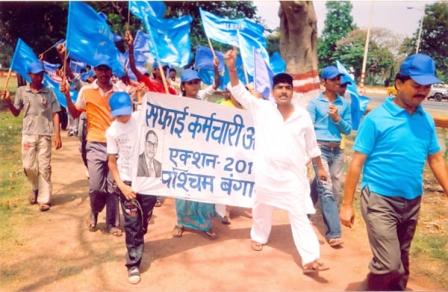Sanitation and Hygiene
News roundup (22 - 31 October 2010) :" India: Land of many cell phones, but fewer toilets"
Posted on 03 Nov, 2010 08:50 AMWastewater/Sanitation
Diploma and Degree courses by Water Sanitation and Hygiene (WASH) Institute
Posted on 29 Oct, 2010 12:30 PMContent and Image Courtesy: Water Sanitation and Hygiene (WASH) Institute
Water Jobs via DevNetJobsIndia.org dated October 27, 2010
Posted on 27 Oct, 2010 01:37 PMContent Courtesy: DevNetJobsIndia
- Short Term Assignment - Social Researcher / Documentation Specialist
Water Sanitation and Hygiene (WASH) Institute
Launching Samajik Parivartan Yatra
Posted on 25 Oct, 2010 01:29 PMManual scavenging is the most obnoxious and inhuman practice violating the dignity and human personhood of safai karmacharis. It involves the engagement or employment of sections of people to manually dispose human excreta from dry latrines with bare minimum aids such as scrappers, brooms and baskets.
Manual scavenging is integrally linked with caste system and is imposed on certain dalit sub-caste groups particularly on their women. As a result all persons engaged in manual scavenging are dalits, and of them 82% are women.
Samajik Parivartan Yatra updates - 7th October, 2010 : Community meeting held in Valmiki Mohalla
Posted on 22 Oct, 2010 03:19 PMFrom Ludhiana: Bassi Pathana Town - Fathegar sagar district:
A Community meeting was held in Valmiki Mohalla. It was attended by local eminent persons from the community, Mr. Sardar Sukhdev Singh Jamagal - rtrd Additional Judge, Mr. Kaval Jit Singh Mattu, Advocate, Mr. Dholak Ram - and President, Safai karmachari Union, and community leader Mr. Ram ji Lal, Govt Employee. 12 liberated SK women took the responsibility of organising a meeting in the basti with the support of committee people. They invited the community as well as general public to the meeting, where the mission, demands, SKA’s back ground were discussed and people’s views were taken.
Community-Led Total Sanitation (CLTS) newsletter for September 2010 : "Training of Trainers on Community Led Total Sanitation in Gulbarga, Karnataka"
Posted on 21 Oct, 2010 02:25 PMArticle and Image Courtesy: Community Led Total Sanitation (CLTS)

Community Led Total Sanitation (CLTS) is an innovative methodology for mobilising communities to completely eliminate open defecation (OD).
Urban local initiatives and government responses: A case of Dev Nadi in Pune
Posted on 21 Oct, 2010 01:26 PMMost of the rivers and streams in urban India are dead. With a very few and rare exceptions, these once-beautiful water bodies have been encroached upon, sources dried up or converted into sewage drains all over the country.Water is being sourced or pumped from sites upstream of the city for its needs or from long distances and the city administration has little incentive for cleaning its own muck. The dismal figures of urban sewage treated by sewage treatment plants, their installed capacity and efficiency stand testimony to this.
The employment of manual scavengers and construction of dry latrines (prohibition) act - Directorate of Municipal Administration (1993)
Posted on 12 Oct, 2010 11:24 AMThe document goes on to describe the details of the implementation of the Act and includes:
‘Samajik Parivarthan Yatra’ (National Yatra for Social Transformation)
Posted on 11 Oct, 2010 11:51 AM The historical ‘Samajik Parivarthan Yatra’ (Rally for Social Transformation), has been started to consolidate the gains of the movement for total eradication by liberated safai karmacharis who for the first time are bonding with one another began the journey for social change together, to inspire others who are still engaged in manual scavenging to free themselves from the obnoxious practise and regain their sense of dignity, and also to achieve their rightful claims for the rehabilitation package and dignified alternative livelihoods on the one hand; and on the other, to motivate civil society to reject the heinous practice of manual scavenging. The Bus Yatra has been planned to start from five different corners of India, and traverse through 160 districts in 20 states and finally culminate in New Delhi with a large rally. Each route has been named after an eminent person who contributed to social change in a revolutionary manner.
The historical ‘Samajik Parivarthan Yatra’ (Rally for Social Transformation), has been started to consolidate the gains of the movement for total eradication by liberated safai karmacharis who for the first time are bonding with one another began the journey for social change together, to inspire others who are still engaged in manual scavenging to free themselves from the obnoxious practise and regain their sense of dignity, and also to achieve their rightful claims for the rehabilitation package and dignified alternative livelihoods on the one hand; and on the other, to motivate civil society to reject the heinous practice of manual scavenging. The Bus Yatra has been planned to start from five different corners of India, and traverse through 160 districts in 20 states and finally culminate in New Delhi with a large rally. Each route has been named after an eminent person who contributed to social change in a revolutionary manner.
Analysis of the UN General Assembly's Resolution on Right to Water and Sanitation
Posted on 30 Sep, 2010 06:47 PMThe historic UN General Assembly Resolution declaring Water and Sanitation as a Right, was passed on the 28th July 2010.
What is surprising is the complete silence to this UN Resolution from some of the countries who have been traditional champions of human rights, in terms of celebrating it as a historic achievement in advocating a basic right to water and sanitation. Instead some of them went one step short of openly opposing and vetoing the UN Resolution and have heaped criticism on Bolivia for tabling this UN Resolution.





